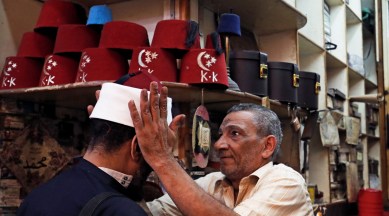📣 For more lifestyle news, click here to join our WhatsApp Channel and also follow us on Instagram
One of Egypt’s last fez makers takes pride in craft despite drop in popularity
After the country's military toppled Mohamed Ali Pasha's ruling dynasty in 1952, however, President Gamal Abdel Nasser abolished the fez as it was considered one of the symbols of the former ruling elite.

For nearly 45 years, Nasser Abdel Basset has been a proud maker of the fez, the iconic felt hat that was once worn by Egypt’s elite, bureaucrats and students.
Located in the Old Cairo street of al-Ghoureya, Abdel Basset’s workshop is one of the very few remaining.
monthly limit of free stories.
with an Express account.
“I learned the craft from an apprentice, I inherited it and I am now passing it on. You say that the craft will disappear? How come? I’m passing it on to my children,” the 60-year-old craftsman said.
The industry flourished during the rule of Mohamed Ali Pasha, an Ottoman army officer who seized power in Egypt in 1805. Wearing the fez was almost mandatory for the country’s leading officials, public employees and students and was considered a sign of the wearer’s stature and education.
After the country’s military toppled Ali’s ruling dynasty in 1952, however, President Gamal Abdel Nasser abolished the fez as it was considered one of the symbols of the former ruling elite.
Students and scholars at the thousand-year-old al-Azhar University as well as other Muslim religious clerics are now Abdel Basset’s only clients, as it represents an important part of their uniform and history.
“As long as al-Azhar is there, we will work,” Basset said.
📣 For more lifestyle news, follow us on Instagram | Twitter | Facebook and don’t miss out on the latest updates!
📣 For more lifestyle news, click here to join our WhatsApp Channel and also follow us on Instagram